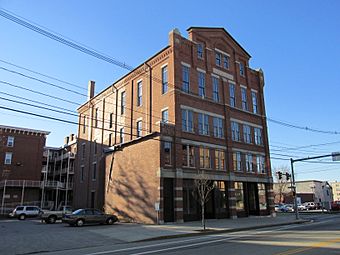Dominican Block facts for kids
Quick facts for kids |
|
|
Dominican Block
|
|

Dominican Block
|
|
| Location | 141-145 Lincoln Street, Lewiston, Maine |
|---|---|
| Built | 1882 |
| Architect | Coombs, George M. |
| Architectural style | Queen Anne |
| NRHP reference No. | 80000212 |
| Added to NRHP | January 15, 1980 |
The Dominican Block is an old and important building in Lewiston, Maine. You can find it at 141-145 Lincoln Street. This building was designed in the beautiful Queen Anne style. A famous local architect named George M. Coombs designed it in 1882.
For many years, the Dominican Block was a very important place. It served as a main social center for the growing French-American community in Lewiston. Because of its history and design, it was added to the National Register of Historic Places in 1980.
Exploring the Dominican Block's Design
The Dominican Block stands at the corner of Lincoln and Chestnut Streets. It is not far from the old mill buildings in Lewiston. This building is about four and a half stories tall. It is made mostly of brick, with nice granite stone details.
The ground floor has two shop fronts. These are separated by strong columns made of brick and granite. To the left of the shops, there is an entrance to the floors above. Above each shop, you can see groups of three windows. These windows go up to the fourth floor. The very top half-story has a raised section in the middle. This part is three windows wide and has fancy brickwork. It also features round-arch windows on the sides.
Who Designed This Building?
The building was designed by a local architect named George M. Coombs. He created the plans in 1882. The Dominican Block is a great example of the Queen Anne Revival style. This style uses a lot of brick. The building looks similar to other designs Coombs created in Lewiston and other places.
The Dominican Block's Story and Purpose
The building was constructed by the local Dominican Order. This group wanted to offer many social and community services. They aimed to help the growing French Catholic population in the city. The area where the building was built was even called "Little Canada" back then.
A local newspaper once said the building was almost like a city hall for the French-speaking people. When it first opened, the Dominicans ran a school inside. This school taught both religious and regular subjects. The building was also used for church services, community meetings, and even plays. Today, the building is owned by private groups. It is now used for typical businesses and social events.
 | William Lucy |
 | Charles Hayes |
 | Cleveland Robinson |



